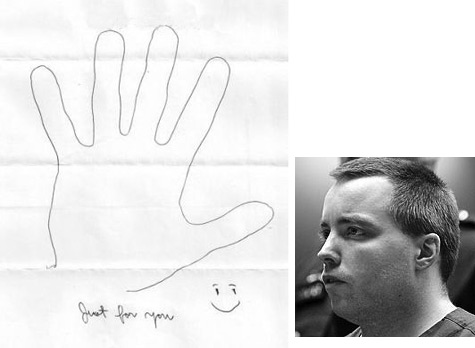
KILLER COLLECTIBLES: A trace-drawing of convicted murderer Jeff Mailhot's hand — available for $34.99 — has drawn the ire of activists. |
Incarcerated in a maximum-security prison in Cranston, Rhode Island, Jeff Mailhot grabbed a pen and a sheet of stationery and traced an outline of his beefy left hand. Beside it, the man who four years ago confessed to choking three women in his Woonsocket apartment and cutting them into pieces with a handsaw doodled a smiley face. Then he added the message: “Just for you.”
Act fast and that masterpiece could be yours, for just $34.99. It’s for sale online at supernaught.com, but odds are it will move quickly. After all, there’s blood on that big mitt and, as repulsive as it is to acknowledge, these days killers are big business in the art world.
Mailhot is the only serial killer incarcerated in Rhode Island’s prisons. There was a book, a few cable TV shows, and now, maybe, fans. Serial slayers, mass murderers, psychotic predators — they’ve become celebrities, in some circles as big as rock stars and pro quarterbacks. Go to the movies, turn on the tube, wander the aisles at Barnes & Noble, and you’ll find their faces.
It’s not surprising that a good number of them are trying to cash in, peddling autographs, art work, their old prison clothes, hair clippings, and anything else they think might get a rise from collectors. An entrepreneur in Maine has even produced a serial-killer calendar filled with portraits of real psychos, each painted by one of the same, Nico Claux, the so-called Vampire of Paris, who spent seven years in a French prison for murder.
eBay has banned the stuff, but that hasn’t slowed the trade. A half-dozen dealers and traders have launched Internet sites where they hawk items that are often obtained by corresponding directly with murderers behind bars. Paintings by John Wayne Gacy Jr., convicted of killing more than 30 young men (and executed by lethal injection in the state of Illinois in 1994), have reportedly sold for as much as $9500. Items linked to Charles Manson command top dollar, too. For most inmates, though, the take is small, just enough for a few Snickers bars from the prison canteen.
As might be expected, there’s no shortage of public outrage. “Whether it’s a thousand dollars or one thin dime, it’s blood money,” says Andy Kahan, an anti-crime activist in Texas, who has labeled such collectibles “murderabilia.”
Kahan is pushing for national legislation that would bar prison inmates from using the postal system for interstate or foreign commerce of any kind. And largely due to his efforts, eight states have adopted legislation that prohibit inmate entrepreneurs from making money off their infamy.
There’s nothing new about laws aimed at preventing lawbreakers from cashing in on their notoriety. After the arrest and conviction of New York serial killer David Berkowitz — better known as “Son of Sam” — many states passed laws that would bar lawbreakers from profiting from their crimes, or the notoriety gained from them. The US Supreme Court eventually struck down the original “Son of Sam” laws — including one in Massachusetts — on the grounds that such bans violated the First Amendment right to freedom of speech.